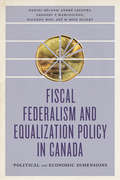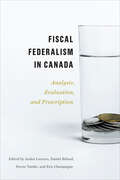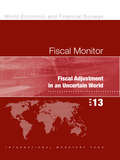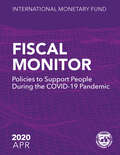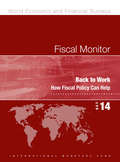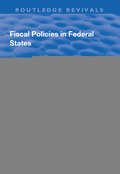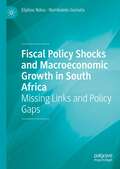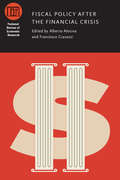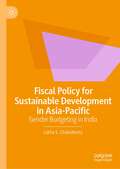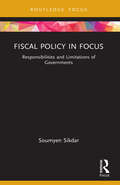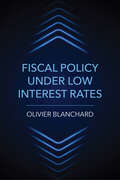- Table View
- List View
Fiscal Federalism and Equalization Policy in Canada: Political and Economic Dimensions
by Gregory P. Marchildon André Lecours Daniel Béland Haizhen Mou M. Rose OlfertFiscal Federalism and Equalization Policy in Canada aims to increase public understanding of equalization and fiscal federalism by providing a comparative and multidisciplinary perspective on the history, politics, and economics of equalization policy in Canada. The authors provide a brief history, an analysis of the politics of equalization as witnessed over the last fifteen years, and a discussion of key economic debates concerning the role of the program and its effects. They also explore the relationship between equalization and other components of fiscal federalism, particularly the Canada Health Transfer and the Canada Social Transfer. The result is an analysis that draws from the best scholarship available in the fields of economics, economic history, political science, political sociology, and public policy.
Fiscal Federalism in Canada: Analysis, Evaluation, Prescription
by André Lecours Daniel Béland Trevor Tombe Eric ChampagneFeaturing insights from some of the top specialists in the country, Fiscal Federalism in Canada unpacks numerous complexities of fiscal federalism in Canada. The book features key regional and provincial perspectives, while taking into account Indigenous realities, the three territories, and municipal affairs. The contributing authors go beyond the major federal transfers to examine the financing of education, cities, infrastructure, and housing. This volume shows that fiscal federalism is much more than simply an aggregate of individual programs and transfers. It highlights the role of actors other than the federal and provincial governments and recalls the importance of territoriality. The book pays close attention to the political dimension of fiscal federalism in Canada, which is at the heart of how the federation functions and is essential to its governance. Fiscal federalism is central to the funding of critical programs through intergovernmental transfers, but it is also the focus of political debates on territorial redistribution. In tackling essential questions, Fiscal Federalism in Canada contributes to the so-called second-generation fiscal federalism literature, taking stock of the critical sociological and political issues at its core.
Fiscal Federalism in Theory and Practice
by Teresa Ter-MinassianA report from the International Monetary Fund.
Fiscal Incentive Effects of the German Equalization System
by Annalisa Fedelino Sven Jari StehnA report from the International Monetary Fund.
Fiscal Management of Scaled-Up Aid
by Richard Allen Sanjeev Gupta Duncan Last Isabell Adenauer Kevin Fletcher Shamsuddin Tareq Gerd SchwartzThe international community has committed to scaling up aid and improving aid delivery to low-income countries to help them meet the Millennium Development Goals. Other "emerging" donors, public and private, are increasing their assistance, and debt-relief initiatives are creating space for new borrowing. Remittances to low-income countries have been on a precipitous rise, and many countries are benefiting from high commodity prices. Fiscal Management of Scaled-Up Aid explores approaches to the sound fiscal management that will be required to ensure effective and sustainable use of these flows. With a medium-term perspective and efficient use of resources in mind, this paper addresses questions that shape fiscal policy response to scaled-up aid. Drawing on IMF Fiscal Affairs Department technical assistance to member countries, it outlines factors that should be taken into account in preparing an action plan for public financial management reform and proposes specific measures that will assist countries in strengthening fiscal institutions
Fiscal Monitor
by International Monetary FundIMF staff members examine the reason for the low interest rates paid for sovereign bonds issued by the U. S. and Japan, the sustainability of fiscal improvements in emerging economies, and how long it will take to lower public debt worldwide. Appendices review the theory of fiscal devaluation, analyze past privatization transactions, and track the main determinants of stock-flow adjustments over the last three decades. Color tables and graphs are provided. Annotation ©2012 Book News, Inc. , Portland, OR (booknews. com)
Fiscal Monitor April 2013: Fiscal Adjustment in an Uncertain World
by International Monetary FundA report from the International Monetary Fund.
Fiscal Monitor, April 2020: Policies To Support People During The Covid-19 Pandemic (Fiscal Monitor Ser.)
by International Monetary FundA report from the International Monetary Fund.
Fiscal Monitor, October 2014: Back to Work How Fiscal Policy Can Help
by International Monetary FundA report from the International Monetary Fund.
Fiscal Objective in the Post IMF Program World: The Case of Albania
by Jiri JonasA report from the International Monetary Fund.
Fiscal Policies in Federal States
by Dietmar BraunThis title was first published in 2003.Investigating the impact of federal structure on fiscal policy-making in four country cases, this book answers the question as to what extent federal structures hinder or, on the contrary, enhance a state's decision and co-ordination capacity in the field of fiscal policy. It questions the common assumption that federal structures restrain the co-ordination and hence macroeconomic management capacity. Well-documented and meticulously presented, this book will be useful for all those working in the field of policy research, and more generally for those who wish not only to attain a deeper and more comprehensive view on fiscal policy making or federalism, but on the territorial dimension of fiscal policy.
Fiscal Policy Issues During the Transition in Russia
by Augusto Lopez-Claros Sergei V. AlexashenkoSince 1992, the Russian Federation has moved away from a command economy and has laid the foundation of a market-based system. This paper examines some of the key fiscal policy issues that arose in 1992-96, the period following the onset of economic liberalization and reform.
Fiscal Policy Making in the European Union: An Assessment of Current Practice and Challenges
by Martin Larch João Nogueira MartinsThis book examines key aspects of the measurement of fiscal policy making in the EU fiscal surveillance framework, highlighting strengths and weaknesses of current assessment practice. Based on the proceedings of a workshop organized by the European Commission’s Directorate-General Economic and Financial Affairs, the book’s contributions from leading experts will be of particular value to individuals and institutions involved in the fields of national and international economics and finance. Key Features: chapters are arranged within three main sections: Long-term sustainability; Measurement of the underlying budgetary position and discretionary fiscal policy; Reliability of fiscal indicators edited by Martin Larch and João Nogueira Martins expert contributors include António Afonso, Fabrizio Balassone, Fernando Ballabriga, Roy Barrell, Peter Brandner, Peter Claeys, Leopold Diebalek, Per Eckefeldt, Jonas Fischer, Daniele Franco, Jagadeesh Gokhale, Ian Hurst, Walpurga Köhler-Töglhofer, György Kopits, Martin Larch, Carlos Martinez-Mongay, James Mitchell, João Nogueira Martins, Jan in ’t Veld, Stefania Zotteri text amply supported by charts and tables. bibliography and Index
Fiscal Policy Rules for Oil Producing Countries: A Welfare-Based Assessment
by Wojciech MaliszewskiA report from the International Monetary Fund.
Fiscal Policy Shocks and Macroeconomic Growth in South Africa: Missing Links and Policy Gaps
by Eliphas Ndou Nombulelo GumataThis book explores the disconnect between fiscal policy and macroeconomic development in South Africa. It analyses the factors that have contributed to the lack of economic growth in the country over recent decades and outlines an improved fiscal policy framework that increases investment and employment. Particular attention is given to the impact of government debt and its relationship with GDP, the connection between budget deficits and interest rates, and how economic policy uncertainty affects employment dynamics and inflation. This book provides practical fiscal policy suggestions to increase economic growth in South Africa and Africa more generally. It will be relevant to researchers and policymakers interested in African economics and economic policy.
Fiscal Policy after the Financial Crisis (National Bureau of Economic Research Conference Report)
by Alberto Alesina Francesco GiavazziThe recent recession has brought fiscal policy back to the forefront, with economists and policy makers struggling to reach a consensus on highly political issues like tax rates and government spending. At the heart of the debate are fiscal multipliers, whose size and sensitivity determine the power of such policies to influence economic growth. "Fiscal Policy after the Financial Crisis" focuses on the effects of fiscal stimuli and increased government spending, with contributions that consider the measurement of the multiplier effect and its size. In the face of uncertainty over the sustainability of recent economic policies, further contributions to this volume discuss the merits of alternate means of debt reduction through decreased government spending or increased taxes. A final section examines how the short-term political forces driving fiscal policy might be balanced with aspects of the long-term planning governing monetary policy. A direct intervention in timely debates, "Fiscal Policy after the Financial Crisis "offers invaluable insights about various responses to the recent financial crisis.
Fiscal Policy and Economic Cycles in Oil-Exporting Countries
by Aasim M. Husain Kamilya Tazhibayeva Anna Ter-MartirosyanA report from the International Monetary Fund.
Fiscal Policy and Economic Development
by Alex Mourmouras Peter RangazasA report from the International Monetary Fund.
Fiscal Policy and the Current Account
by Jacques Bouhga-Hagbe Paolo Mauro S. M. Ali Abbas Antonio J. Fatás Ricardo C. VellosoA report from the International Monetary Fund.
Fiscal Policy for Sustainable Development in Asia-Pacific: Gender Budgeting in India
by Lekha S. ChakrabortyThis book examines how macro-fiscal policy can lead to gender-aware human development in an emerging economy like India, with special reference to gender budgeting. Integrating gender lens in macro-fiscal policies has been widely recognized in international and national policy making and budgeting. The book highlights the gender diagnosis—the measurement issues relate to construction of gender outcome variables; the statistical invisibility of unpaid care economy sector and how deficiency in public infrastructure can accentuate the private costs; the analytical link between gender outcome variables and macro-fiscal policy frameworks; the role and impact of fiscal transfers on gender equality outcomes at subnational levels; time series of gender budgets in India across sectors and its fiscal marksmanship; gender disaggregated public expenditure benefit incidence analysis to understand the distributional impacts of public spending on women across income quintiles and suggest policy alternatives. The book uses unique database—time use survey data and the disaggregated demand for grants, expenditure budgets using gender lens. The book employs case study, simple statistical tools for the analysis and econometric methodology.
Fiscal Policy in Focus: Responsibilities and Limitations of Governments (Routledge Focus on Management and Society)
by Soumyen SikdarThe majority of economists today are opposed to allowing governments a significant role in economic affairs. In particular, demand management and redistributive policies are frowned upon, and supply-side policies (that concentrate on enhancing the profitability of business operations) are advocated as the only legitimate channels of government action. The possibility of ‘government failure’ in the economic sphere is endlessly emphasised.The book argues that this view is only partially correct, at best. To make development inclusive and sustainable over the long run, the state must step in as an active enabler and regulator of private initiative. In a good society, the public–private relationship should be complementary, not adversarial. The enabler–regulator duty of the government cannot be effectively discharged with only supply-side and monetary instruments. Well-designed, effectively implemented fiscal action is indispensable for promoting social welfare with its twin aspects of efficiency and distributive justice.Within a short compass, the strengths and limitations of tax expenditure policies in managing the economy are discussed in non-technical language, keeping the ‘government failure vs market failure’ debate as a focal point.
Fiscal Policy in Oil Producing Countries During the Recent Oil Price Cycle
by Mauricio Villafuerte Pablo Lopez-MurphyA report from the International Monetary Fund.
Fiscal Policy under Low Interest Rates
by Olivier BlanchardRethinking fiscal and monetary policy in an economic environment of high debt and low interest rates.Policy makers in advanced economies find themselves in an unusual fiscal environment: debt ratios are historically high, and—once the fight against inflation is won—real interest rates will likely be very low again. This combination calls for a rethinking of the role of fiscal and monetary policy—and this is just what Olivier Blanchard proposes in Fiscal Policy under Low Interest Rates.There is a wide set of opinions about the direction that fiscal policy should take. Some, pointing to the high debt levels, make debt reduction an absolute priority. Others, pointing to the low interest rates, are less worried; they suggest that there is still fiscal space, and, if justified, further increases in debt should not be ruled out. Blanchard argues that low interest rates decrease not only the fiscal costs of debt but also the welfare costs of debt. At the same time, he shows how low rates decrease the room to maneuver in monetary policy—and thus increase the benefits of using fiscal policy, including deficits and debt, for macroeconomic stabilization. In short, low rates imply lower costs and higher benefits of debt.Having sketched what optimal policy looks like, Blanchard considers three examples of fiscal policy in action: fiscal consolidation in the wake of the Global Financial Crisis, the large increase in debt in Japan, and the current US fiscal and monetary policy mix. His conclusions hold practical implications for economic and fiscal policy makers, bankers, and politicians around the world.
